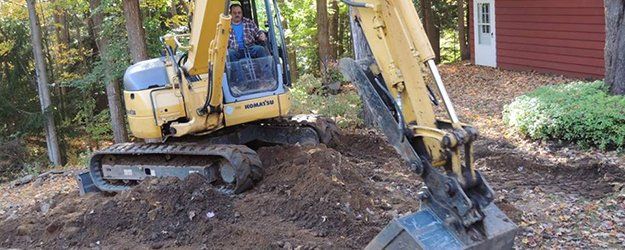Commercial Lancaster Trenching - Trenching Services for Businesses in Lancaster
Commercial Lancaster Trenching - Trenching Services for Businesses in Lancaster
Blog Article
Comprehensive Excavation Methods: Grasping the Fundamentals for Success
In the realm of building and civil engineering, the value of efficient excavation methods can not be overemphasized. The careful preparation, precise implementation, and precise attention to information required in excavation jobs require a comprehensive technique that incorporates different fundamental facets. From initial dirt evaluation to the execution of safety steps and routine progression tracking, grasping these core components is necessary for accomplishing success in any excavation venture. The true proficiency exists not simply in comprehending these principles yet in flawlessly incorporating them to navigate the complexities of excavation tasks with finesse.
Understanding Excavation Project Planning

The preliminary stage of any excavation task is the planning stage, where critical choices are made that can considerably influence the outcome of the job. Comprehending the task extent, timeline, and budget restrictions is vital for developing a thorough excavation plan that ensures the project's success.
One trick facet of excavation task preparation is the development of a thorough timeline that details the sequence of turning points, due dates, and tasks. By very carefully taking into consideration all these aspects during the preparation phase, excavation jobs can be carried out efficiently and effectively, leading to effective outcomes - excavating ohio.
Dirt Evaluation and Website Evaluation
Conducting detailed dirt evaluation and website examination is an essential action in the preparation stage of any type of excavation project. Dirt evaluation includes identifying the composition, framework, and homes of the dirt at the excavation site. This information is crucial for understanding the soil's bearing capacity, dampness material, and capacity for erosion, which are crucial elements in establishing the excavation techniques and equipment needed for the job.
Website evaluation surpasses dirt evaluation and includes a more comprehensive assessment of the total site problems. This assessment includes recognizing any type of potential threats, such as underground energies, environmental concerns, or unsteady terrain, that might affect the excavation procedure. By completely evaluating the site, project supervisors can develop reliable excavation techniques that focus on security, performance, and environmental management.
Making use of sophisticated modern technologies like ground-penetrating radar, dirt sampling, and drone surveys can boost the accuracy and efficiency of dirt analysis and site examination. Investing time and sources in these preliminary steps can ultimately save time and avoid pricey delays or problems throughout the excavation process.
Equipment Choice and Use
Efficient excavation tasks depend greatly on critical equipment selection and websites use to see this make sure optimal efficiency and productivity. Selecting the appropriate equipment for the job is crucial in maximizing efficiency and lessening downtime. Factors such as the kind of dirt, deepness of excavation, and project scope play a substantial duty in identifying one of the most appropriate tools for the task handy.
In enhancement to find choosing the proper tools, correct usage is vital to task success. Operators must be trained to handle the equipment securely and successfully - excavating ohio. Routine upkeep checks and prompt repair services help prevent failures and guarantee consistent performance throughout the task
Precaution and Rules Conformity
In the realm of excavation projects, prioritizing safety and security steps and compliance with policies is vital to making sure a secure and legally sound functional environment. Safety procedures encompass a variety of practices, consisting of conducting extensive site evaluations, applying appropriate signs and barriers, and offering adequate safety and security training for all personnel entailed in the excavation procedure. Adherence to policies, such as OSHA demands in the USA, guarantees that the excavation job satisfies the essential requirements to shield workers, onlookers, and the surrounding atmosphere.

Surveillance Progression and Adjusting Approaches
Just how can project supervisors effectively track the innovation of excavation tasks and adapt their approaches accordingly to enhance end results? Tracking progression is essential for making certain that excavation jobs remain on track and satisfy deadlines.

Conclusion
In verdict, mastering the principles of detailed excavation methods is crucial for the success of any type of task. By recognizing project preparation, evaluating dirt and website conditions, choosing appropriate tools, abiding by safety and security guidelines, and checking progression, project supervisors can guarantee a effective and smooth excavation process. Implementing these methods will lead to effective results and minimize prospective threats or problems throughout the excavation project.
The preliminary stage of any excavation job is the preparation phase, where important decisions are made that can substantially influence the result of the project. Understanding the job timeline, scope, and budget restrictions is critical for developing a detailed excavation plan that ensures the task's success.
How can predict managers efficiently track the development of excavation projects and adapt their strategies appropriately to optimize end results? By very closely checking progression and being prepared to adjust approaches, job supervisors can improve the total success of excavation projects.
By understanding project planning, examining soil and website conditions, selecting appropriate tools, conforming with safety policies, and keeping an eye on progression, project managers can make certain a efficient and smooth excavation process.
Report this page